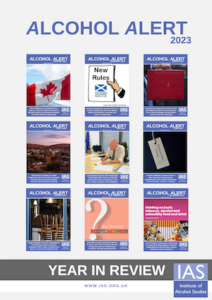In this month’s alert
As we make our way to the end of 2023, we can be confident in having made real progress in the world of alcohol policy this year. The reform of alcohol duty came into force – which will tax all alcoholic products by their strength – and the Treasury has made it clear that public health is an important focus of the policy, as it aims to support “wider UK tax and public health objectives”.
Of course, nothing being simple, there are clear areas where the reform may not be as conducive to good public health as we’d like, particularly if duty rates remain too low and are rarely uprated, as we’ve seen over the past decade. Additionally, cider duty has retained its preferential treatment, with rates far lower than beers of the same strength.
In most other areas of alcohol policy, UK government inertia has continued, leading to the ‘mother of all Parliamentary committees’ – the Public Accounts Committee – stating that it was “surprised and disappointed” that DHSC hasn’t taken the “appalling” harms of alcohol seriously enough. Further evidence of the lack of engagement by the government is that the only policy measure it is driving forward relates to increasing the offering of no and low alcohol products, despite the lack of evidence of how they affect public health.
2023 was also another year in which Scotland continued to lead the way. Public Health Scotland’s final evaluation of the country’s minimum unit pricing policy recommended it continues – due to it reducing alcohol-specific deaths by 13.4% and hospital admissions by 4% – and is uprated to 65p to counter the erosion of its price by inflation. Less clear is the Scottish Government’s position on alcohol marketing restrictions, with the new First Minister, Humza Yousaf, edging around the topic and trying to appease both the powerful whisky industry and public health advocates.
And finally, it is the end of an era for IAS, as we are moving from our office in St James’s Park to a new home in London Bridge/Borough. We really look forward to continuing to work with all our like-minded partners – do visit us if you’re in the area. Here’s to more public health success in 2024!
“For last year’s words belong to last year’s language and next year’s words await another voice. And to make an end is to make a beginning.” ― T.S. Eliot.
Please read on for a roundup of the rest of 2023.
January – Canada’s drinking guidelines change
We began the year with Canada publishing new drinking guidelines, which recognised that the risk of alcohol harm exists on a continuum. Meanwhile, Italy’s biggest farmers’ association branded Ireland’s plans to introduce health warnings on alcohol labels “terrifying” and a “direct attack” against Italy.
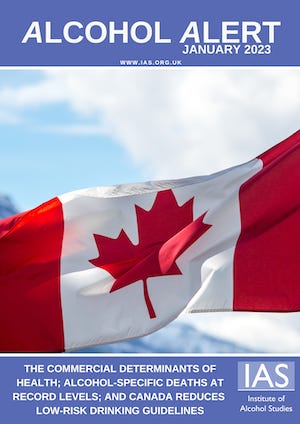
February – Industry hysteria at Scottish marketing restriction proposals
The alcohol industry railed against proposed alcohol marketing restrictions in Scotland, arguing it would harm businesses and push up prices. In the same month, minimum unit pricing (MUP) was found to have had ‘minimal’ impact on the industry. Across the border, DHSC announced £420 million in funding to improve drug and alcohol treatment and recovery services.
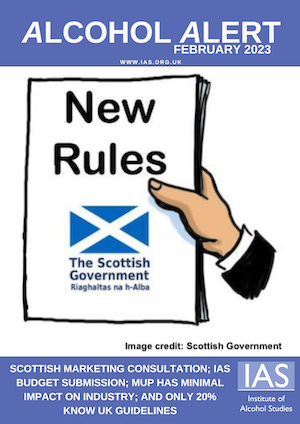
March – Alcohol duty uprated for only a second time in a decade
Alcohol duty was uprated in the Spring Budget (albeit delayed until August), after a decade of freezing and cutting most years. Draught alcohol duty was given a separate relief, to try to reduce the disparity in price between on- and off-trade alcohol. In Scotland, MUP was found to reduce alcohol deaths by 13.4%, but incoming First Minister Humza Yousaf said he’s ‘minded to scrap the marketing consultation’.
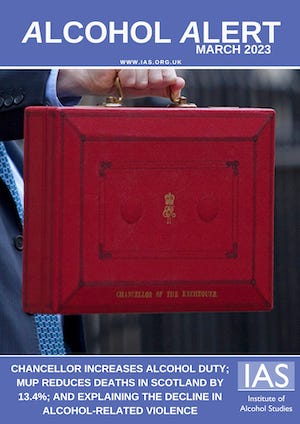
April – Alice Springs continues its alcohol restrictions
Analysis by IAS found that cumulative cuts and freezes to duty will cost the Treasury £23.9 billion from 2013 to 2028. Across the globe, Australia’s Northern Territory extended its three-month trial of alcohol restrictions in Alice Springs, to try to reduce the significant rise in alcohol-related violence and crime.
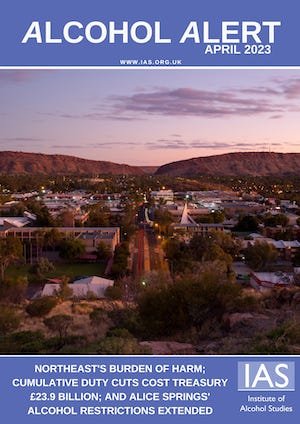
May – Keir Starmer rules out MUP during cost-of-living crises
Ireland became the first country in the world to introduce health warnings on alcohol labels. Inertia continues in the UK though, with the Public Accounts Committee saying the government isn’t taking the ‘appalling’ harms of alcohol seriously enough; and Keir Starmer said he would rule out MUP during a cost-of-living crisis.

June – Welsh MUP has no obvious impact on consumption
Analysis of Welsh MUP revealed a mixed picture, with no obvious impact on consumption. Brewers and wine producers started to reduce the ABV of certain products to save on duty – although some claimed it was due to public health. And back in Ireland, twelve countries expressed their concern to the World Trade Organization regarding Ireland’s labelling plans.
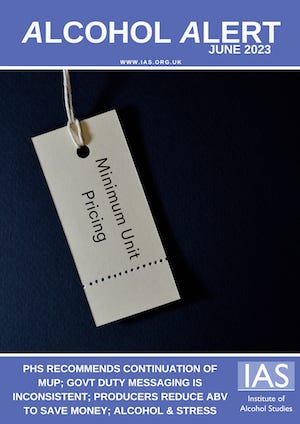
July – BMA lobbies for reduction to drink driving limit
The British Medical Association agreed a motion to lobby government to reduce the drink driving limit. The Social Market Foundation published a report that found more interventionist policies to improve public health are more effective than choice-based measures, such as educational campaigns. And alcohol in Ireland was 70% more affordable than 20 years ago.
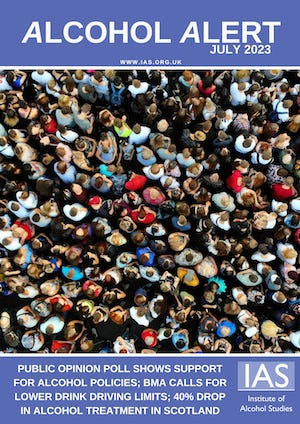
August – Lockdowns did not reduce the proportion of alcohol-related violence
An IAS study on lockdowns found that supermarket and off-license alcohol is a major driver of violent incidents, including domestic violence. Coincidentally, Sunak U-turned on plans to end takeaway pints from on-trade outlets, after industry pressure. And health experts hit back at the Scottish Conservative Shadow Health Secretary for “seeking to undermine the policy” of MUP.
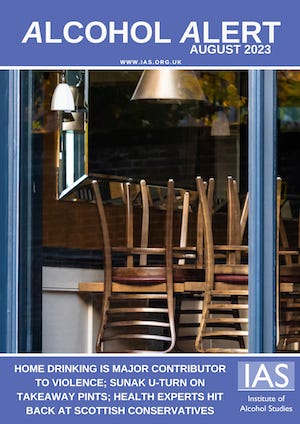
September – Drug Strategy funding not reaching families
Alcohol deaths reached their highest level in 14 years in Scotland, with 1,276 people dying – due to a rise in deaths among women. In London, an economics consultancy found there will be 184 thousand preventable cancers diagnosed in 2023, costing the UK £78 billion. And a report by support charity Adfam showed that funding from the Drug Strategy is not filtering through to families.
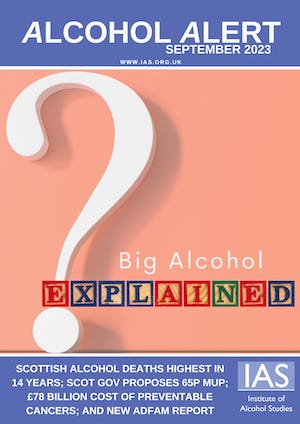
October – No and low alcohol labelling consultation launched
The UK government began its push for an increase in no and low alcohol drinks; its primary harm-reduction measure. Pubs continue to close but employment in the sector increased due to the average pub becoming larger. Down in South Africa, the Global Alcohol Policy Conference called on national governments to establish rules separating the alcohol industry from policy development.
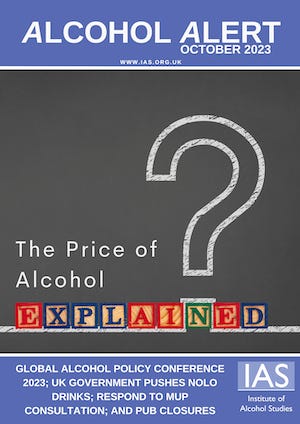
November – Alcohol, tobacco, and junk food companies make £53 billion from harmful consumption
A joint report between the AHA, Obesity Health Alliance and Action on Smoking and Health showed that harmful consumption of alcohol, tobacco, and junk food makes these industries £53 billion every year. Cancer Research UK launched its manifesto, which demands action on prevention and research. And the IMF stated that alcohol duties should cover the full cost of alcohol harm in countries.
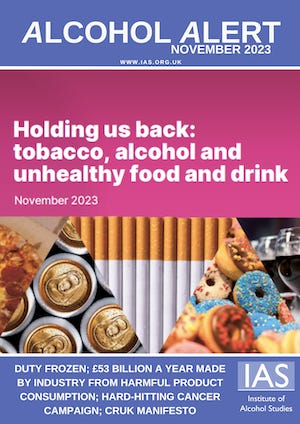
Thank for subscribing to the Alcohol Alert, and we look forward to providing you with more roundups of alcohol research and policy in 2024!

Podcast
Our monthly podcast features interviews with experts from across the sector.
Gambling industry harms and parallels with the alcohol world
Will Prochaska –
Coalition to End Gambling Ads

